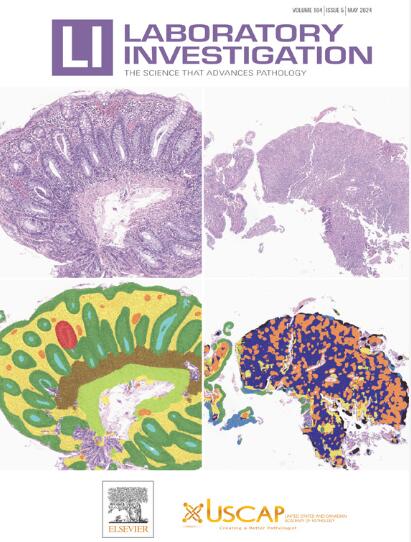Monospecies Bacteria-Induced Chronic Apical Periodontitis Triggers the Aortic Inflammatory Response Via Modulation of Systemic Inflammation and Lipid Metabolism
IF 5.1
2区 医学
Q1 MEDICINE, RESEARCH & EXPERIMENTAL
引用次数: 0
Abstract
Cardiovascular disease (CVD) is the leading cause of death worldwide and has been confirmed to be associated with a common oral bacterial infection—chronic apical periodontitis (CAP). However, the detailed mechanisms remain controversial. CAP can potentially alter systemic inflammation, lipid metabolism, and gut microbiota, all of which contribute to the progression of the aortic inflammatory response. This study aimed to explore the differential effects between Enterococcus faecalis and Porphyromonas gingivalis-CAP on the aortic inflammatory response, which focused on changes in systemic inflammation, lipid metabolism, and gut microbiota, to explore potential mechanisms linking oral disease to CVD. Our results showed P. gingivalis-CAP could activate more serious aortic inflammatory cytokine micro RNA expression (TNF-α, MCP-1, and ICAM-1) than E. faecalis-CAP by promoting higher serum inflammation (TNF-α, IL-6, IL-1α, and MCP-1) and lipid (low-density lipoprotein cholesterol and total cholesterol) levels. Simultaneously, there was no significant change in gut microbiota between them. Furthermore, all serum inflammatory cytokines showed substantial correlations with aortic inflammatory cytokine micro RNA expression, and certain serum lipid indicators showed significant correlations, but only 2 gut microorganisms (Ruminococcaceae and Prevotellaceae) showed significant correlations. The combined results suggest that CAP might activate the aortic inflammatory response in association with changes in the 3 potential mechanisms. However, the promotion of gut microbiota might be relatively weak. Using experimental CAP induced by specific bacteria, in which bacteria are sequestered in the medullary cavity, avoids the direct influence of blood or intestinal pathways and provides new perspectives for studying the mechanism of CVD associated with oral disease. Overall, these findings suggest that CAP may exacerbate systemic inflammation and serum lipid levels in patients with CVD, highlighting the importance of educating such patients on oral hygiene.
单种细菌诱导的慢性根尖牙周炎通过调节全身炎症和脂质代谢触发主动脉炎症反应。
心血管疾病(CVD)是世界范围内导致死亡的主要原因,并已被证实与一种常见的口腔细菌感染——慢性根尖牙周炎(CAP)有关。然而,其具体机制仍存在争议。CAP可以潜在地改变全身炎症、脂质代谢和肠道微生物群,所有这些都有助于主动脉炎症反应的进展。本研究旨在探讨粪肠球菌和牙龈卟啉卟啉链球菌对主动脉炎症反应的差异影响,重点关注全身炎症、脂质代谢和肠道微生物群的变化,以探索口腔疾病与心血管疾病之间的潜在机制。结果表明,与粪孢杆菌相比,牙龈假单胞菌- cap可通过提高血清炎症因子(TNF-α、IL-6、IL-1α和MCP-1)和脂质(LDL-C和TC)水平,激活更严重的主动脉炎性细胞因子mRNA (TNF-α、MCP-1和ICAM-1)表达。同时,它们之间的肠道菌群没有显著变化。此外,所有血清炎症细胞因子与主动脉炎症细胞因子mRNA表达均呈显著相关性,某些血脂指标与主动脉炎症细胞因子mRNA表达呈显著相关性,但只有Ruminococcaceae和Prevotellaceae两种肠道微生物与主动脉炎症细胞因子mRNA表达呈显著相关性。综合结果表明,CAP可能与三种潜在机制的变化相关,从而激活主动脉炎症反应。然而,肠道菌群的促进可能相对较弱。利用特定细菌诱导的实验性CAP,细菌被隔离在髓腔内,避免了血液或肠道通路的直接影响,为研究口腔疾病相关CVD的机制提供了新的视角。总的来说,这些发现表明,CAP可能会加剧CVD患者的全身性炎症和血脂水平,强调了对这些患者进行口腔卫生教育的重要性。
本文章由计算机程序翻译,如有差异,请以英文原文为准。
求助全文
约1分钟内获得全文
求助全文
来源期刊

Laboratory Investigation
医学-病理学
CiteScore
8.30
自引率
0.00%
发文量
125
审稿时长
2 months
期刊介绍:
Laboratory Investigation is an international journal owned by the United States and Canadian Academy of Pathology. Laboratory Investigation offers prompt publication of high-quality original research in all biomedical disciplines relating to the understanding of human disease and the application of new methods to the diagnosis of disease. Both human and experimental studies are welcome.
 求助内容:
求助内容: 应助结果提醒方式:
应助结果提醒方式:


